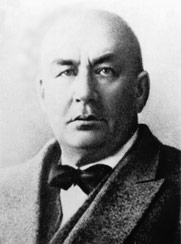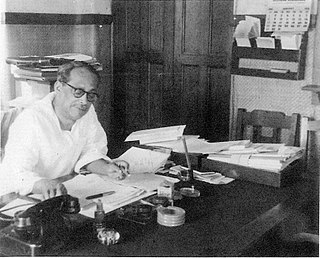
Krishna Chandra Bhattacharya, also known as K.C. Bhattacharya, was a philosopher at the University of Calcutta known for his method of "constructive interpretation" through which relations and problematics of ancient Indian philosophical systems are drawn out and developed so that they can be studied like problems of modern philosophy. He was especially interested in the problematic of how the mind creates an apparently material universe. Bhattacharya encouraged the idea of an immersive cosmopolitanism in which Indian systems of philosophy were modernized through assimilation and immersion rather than through a blind imitation of European ideas.
Charvaka, also known as Lokāyata, is an ancient school of Indian materialism. Charvaka holds direct perception, empiricism, and conditional inference as proper sources of knowledge, embraces philosophical skepticism and rejects ritualism and supernaturalism. It was a popular belief system in ancient India.

Brihaspati, also known as Guru, is a Hindu deity. In the ancient Vedic scriptures of Hinduism, Brihaspati is a deity associated with fire, and the word also refers to a rishi (sage) who counsels the devas (gods). In some later texts, the word refers to the largest planet of the solar system, Jupiter, and the deity is associated with the planet as a Navagraha.

Hindu philosophy encompasses the philosophies, world views and teachings of Hinduism that emerged in Ancient India which include six systems (shad-darśana) – Samkhya, Yoga, Nyaya, Vaisheshika, Mimamsa and Vedanta. In Indian tradition, the word used for philosophy is Darshana, from the Sanskrit root drish.

Indian philosophy refers to philosophical traditions of the Indian subcontinent. A traditional Hindu classification divides āstika and nāstika schools of philosophy, depending on one of three alternate criteria: whether it believes the Vedas as a valid source of knowledge; whether the school believes in the premises of Brahman and Atman; and whether the school believes in afterlife and Devas.

Manabendra Nath Roy was an Indian revolutionary, radical activist and political theorist, as well as a noted philosopher in the 20th century. Roy was the founder of the Mexican Communist Party and the Communist Party of India.
The Buddhist doctrine of the two truths differentiates between two levels of satya in the teaching of the Śākyamuni Buddha: the "conventional" or "provisional" (saṁvṛti) truth, and the "ultimate" (paramārtha) truth.

Debiprasad Chattopadhyaya was an Indian Marxist philosopher. He made contributions to the exploration of the materialist current in ancient Indian philosophy. He is known for Lokayata: A Study in Ancient Indian Materialism, which is his exposition of the philosophy of Lokayata. He is also known for work on history of science and scientific method in ancient India, especially his 1977 book Science and Society in Ancient India on the ancient physicians Charaka and Sushruta. He was awarded the Padma Bhushan, India's third highest civilian honour, posthumously, in 1998.
Āstika and nāstika are concepts that have been used to classify Indian philosophies by modern scholars, as well as some Hindu, Buddhist and Jain texts. The various definitions for āstika and nāstika philosophies have been disputed since ancient times, and there is no consensus. In current Indian languages like Telugu, Hindi and Bengali, āstika and its derivatives usually mean 'theist', and nāstika and its derivatives denote an 'atheist'; however, the two terms in ancient- and medieval-era Sanskrit literature do not refer to 'theism' or 'atheism'. The terms are used differently in Hindu philosophy. For example, Sāṃkhya is both a non-theistic and āstika (Vedic) philosophy, though “God” is often used as an epithet for consciousness (purusha) within its doctrine. Similarly, though Buddhism is considered to be nāstika, Gautama Buddha is considered an avatar of Vishnu in some Hindu traditions.

Fyodor Ippolitovich Shcherbatskoy or Stcherbatsky, often referred to in the literature as F. Th. Stcherbatsky, was a Russian Indologist who, in large part, was responsible for laying the foundations in the Western world for the scholarly study of Buddhism and Buddhist philosophy. He was born in Kielce, Poland, and died at the Borovoye Resort in northern Kazakhstan.

Śramaṇa means "one who labours, toils, or exerts themselves " or "seeker, one who performs acts of austerity, ascetic". During its development, the term came to refer to several non-Brahmanical ascetic religions parallel to but separate from the Vedic religion. The Śramaṇa tradition includes primarily Jainism, Buddhism, and others such as the Ājīvika.

Surendranath Dasgupta was an Indian scholar of Sanskrit and Indian philosophy.
Ajita Kesakambali was an ancient Indian philosopher in the 6th century BC. He is considered to be the first known proponent of Indian materialism, and forerunner to the Charvaka school. He was probably a contemporary of the Buddha and Mahavira. It has frequently been noted that the doctrines of the Lokayata school were considerably drawn from Ajita's teachings.
Payasi was a Cārvāka (materialist) philosopher in ancient India and was possibly a contemporary of Buddha. He was possibly a prince, if early Buddhist and Jaina sources could be believed. The only source of information that exists today about this philosopher is the form of purvapaksa—a material available in the works of others, which are cited for refutation.
Jayarāśi Bhaṭṭa was an Indian philosopher known for his radical skepticism who most likely flourished between 800-840 probably in southern India. He was the author of one of the most extraordinary philosophical work in Indian history, the Tattvopaplavasiṃha in which he professed radical skepticism, which posits the impossibility of knowledge. In his work, he attempts to show the contradictions of various philosophical positions as well as the counter positions. He is loosely affiliated to the materialist Cārvāka/Lokāyata school of philosophy but his affiliation with charvaka is disputed among scholars. He has been differently classified as a sceptic, agnostic or materialist atheist.
Prabhākara was an Indian philosopher-grammarian in the Mīmāṃsā tradition of Kerala.
The Bārhaspatya sūtras, or Lokāyata sutras are the foundational texts of the nastika Charvaka school of materialist philosophy.

Prabodh Chandra Bagchi or P. C. Bagchi was one of the most notable Sino -Indologists of the 20th century. He was the third Upacharya (Vice-Chancellor) of Visva-Bharati University.

Lokayata: A Study in Ancient Indian Materialism is a famous book on the Lokayata school of Indian philosophy by Debiprasad Chattopadhyaya first published in 1959.
Lalit Mohan Banerjee was an Indian surgeon, medical academic and the first medical professional to receive the degree of Master of Surgery from the University of Calcutta. He was a professor of surgery at R. G. Kar Medical College and Hospital of the Calcutta University and the personal surgeon to the President of India. He was one of the founders of the Association of Surgeons of India and was its third president (1941–1942). It was during this period, he had an opportunity to operate on Rabindranath Tagore, the renowned poet and Nobel Laureate. The Government of India awarded him the third highest civilian honour of the Padma Bhushan, in 1955, for his contributions to medical science. A road in Sodepur has been named after him as Dr. L. M. Banerjee Road.











